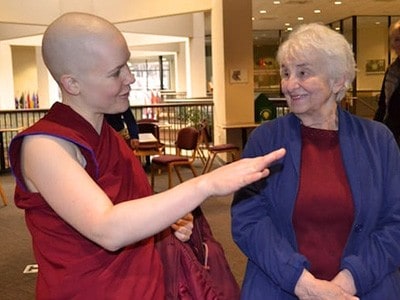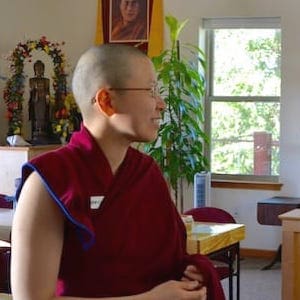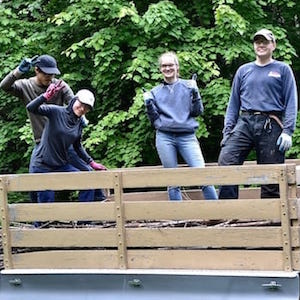The power of an idea
The power of an idea

A recent phone call with my grandmother brought to life the power of an idea, how just the vague notion of a different way of life or an alternate perspective can inspire the mind and have an impact.
My grandmother was telling me about Peg—her 93-year-old friend who is living in a rest home and has been having a hard time because she is now visually impaired and has a severe auditory impairment. She keeps trying different hearing aids, but they do not seem to work; when people yell in close proximity, some things get through, but not all. So Peg is struggling with this transition to a very internal life, as her body is physically limiting her ability to engage with the outside world, at least as she used to.
Very casually, my grandmother mentioned that Peg had told her she wishes she had my karma, to be in the position that I am in, because she thinks someone like me would have a more peaceful mind to handle the difficulties she is currently working with. My grandmother had been telling her about me: my decision to ordain, to live in a monastery, and what we do here. She may have even shared a little bit about the Buddha’s teachings, which my grandmother is learning about through the letters we write, watching Bodhisattva’s Breakfast Corner, and articles she reads.
I was quite stunned to hear this. I do not know Peg. We have never met, and I’m sure that I am not the main topic of conversation between Peg and my grandmother, when they see each other each week. So Peg really only has this vague idea of some young woman who has chosen to devote her life to spiritual practice. Yet this vague idea of an alternate way of life, a life dedicated to developing love and compassion, to contemplation and meditation and being of service to others—the way I’ve described what we’re doing here to my grandmother—had an impact. It was significant enough for the idea to arise that, “There’s an alternative way to respond to the difficulties I’m experiencing right now—one that might bring me more inner peace, if I could do that.”
I do not see this situation being connected to me as an individual, something specific about Thubten Lamsel. This is the power of an idea, the power of virtue and the inspiration others can draw from embodied representations of ethical conduct, love, compassion and the search for truth. For me, this is also reflective of the power of monasticism. Each monastic, by going forth into homelessness and setting out to actualize the eightfold noble path, is making a public statement that there is an alternative to the chaos of a life under the control of ignorance, attachment, and anger. And this public statement has an impact greater than I think we can imagine.
We all have some level of friends and family that we are connected to, who in some way have their finger on the pulse of our life. They know at least a little bit about what we are doing, and the fundamental idea that we are trying to turn away from the pursuit of happiness through sensual pleasure and distraction, and are rather intent on creating virtue, being of benefit to others, and the pursuit of wisdom. For some of our family and friends, this may be strange and without context. But for others, it is a source of inspiration—and they share this inspiration with their beloved, their friends and family too. In this way, our pursuit of ethical conduct, love, compassion and wisdom sends out ripples into the world.
Seeing even a small instance of this ripple effect helps deepen my refuge in the Buddha, Dharma and Sangha. Through the great kindness of the Buddha, I have been able to learn and practice techniques that bring about not only bring about my own happiness and increased peace of mind, but help me to—even indirectly—let others know that there is an alternative to the unsatisfactory conditions they are currently immersed in.
I can only assume from Peg’s comment—as relayed to me by my grandmother—about an alternate way to deal with her difficulties brought her some peace of mind. That is what I hope. More than that, is the strong wish that Peg could see her own potential, right now, to cultivate peace, love, wisdom and all other good qualities within herself.
To be honest, quite a lot of sadness arose thinking about this, feeling so connected to this person halfway across the world, whom I am unable to fully reach out to and “give” her the peace of mind that she seeks. But this is the practice—to develop the fortitude that can withstand not being able to wave some magic wand and “make it all better” right now, to be able to stand as a witness to the suffering of others and know I am not able to make it go away.
Rather, I can turn my mind to the amazing potential we all possess, to become fully awakened Buddhas, and take refuge in that. I can draw inspiration from my understanding of that potential and deepen my commitment to practice the Buddha’s teachings in order to transform my own mind and heart, to personally actualize that potential. I can see instances like Peg’s comment as evidence that causes produce result—that my practice of virtue has an effect, that it benefits others. From strong conviction in the law of cause and effect, I will then have the energy to continue my practice, no matter what difficulties arise, and proceed steadily towards buddhahood.
So, today may we rejoice in whatever practice we do, knowing that it has far-reaching benefits to many people, in ways we might not personally know about. May we cherish our opportunity to learn about the Dharma, knowing that many others wish they were in our position, to have our access to tools to calm the heart and mind amidst the many sufferings of daily life. May we use our recognition of our good fortune to reaffirm our bodhicitta motivation and proceed step by step towards full awakening with a heart of joy.


